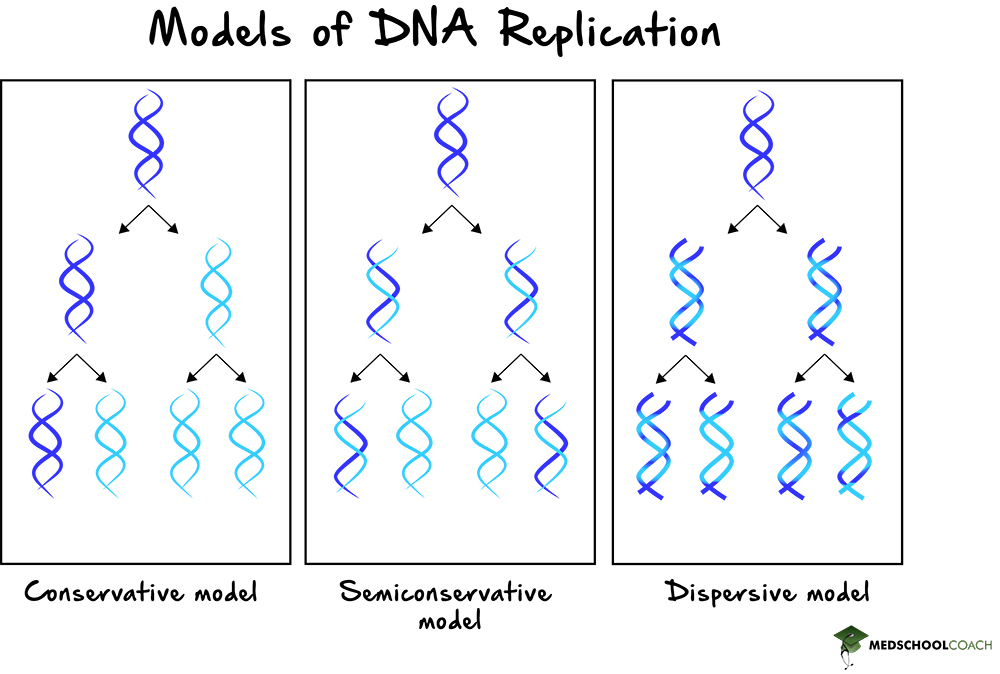Semi-Conservative DNA Replication
MCAT Biology - Chapter 1 - Section 2.1 - DNA - Semi-Conservative DNA Replication
- Home
- »
- MCAT Masterclass
- »
- Biological and Biochemical Foundations of Living Systems
- »
- Biology
- »
- Semi-Conservative DNA Replication – MCAT Biology
Sample MCAT Question - Semi-Conservative DNA Replication
According to which model of DNA replication are completely brand new double-stranded molecules of DNA synthesized?
a) Conservative model
b) Semi-conservative model
c) Dispersive model
d) None of the above
Get 1-on-1 MCAT Tutoring From a Specialist
With MCAT tutoring from MedSchoolCoach, we are committed to help you prepare, excel, and optimize your ideal score on the MCAT exam.
For each student we work with, we learn about their learning style, content knowledge, and goals. We match them with the most suitable tutor and conduct online sessions that make them feel as if they are in the classroom. Each session is recorded, plus with access to whiteboard notes. We focus on high-yield topics if you’re pressed for time. If you have more time or high-score goals, we meticulously cover the entire MCAT syllabus.
DNA Replication Intro
DNA replication is the process of producing two identical copies of DNA from one original copy. This process is important because, in order for parent cells to pass on DNA to daughter cells, that DNA must first be copied. DNA replication is therefore an essential aspect of biological inheritance, and all living organisms undergo this process.
Models of DNA Replication: Conservative, Dispersive, and Semi-Conservative
Several models of DNA replication have been proposed throughout the history of science (Figure 1). The conservative model proposed that brand new copies of double-stranded DNA are synthesized without altering the original double-stranded DNA molecules. Another model, the dispersive model, proposed that the original DNA molecules are broken up into several pieces which then get dispersed throughout the newly produced strands of DNA.
Today, however, neither of these models is accepted as correct. Instead, a scientific consensus has formed around a third model of DNA replication, known as the semi-conservative model. As shown in Figure 1, the semi-conservative model proposes that the original double-stranded DNA molecule is separated into two single strands, which then serve as the template for the synthesis of two new strands. These new strands are called complementary strands because their nucleotide base pairs are “complementary” to the original template strand. Thus, adenine and cytosine on one strand will always be paired with a thymine and guanine respectively on the other strand. The result of semi-conservative replication is two daughter DNA molecules with a nucleotide sequence identical to that of the parent molecule and which each have one strand from the parent molecule and one newly synthesized stand. The fact that one strand is conserved from the parent molecule but not both is why this model of DNA replication is labelled “semi-conservative”.

Advantages of Semi-Conservative DNA Replication
From a biological perspective, the semi-conservative DNA replication has several key advantages. First of all, because only one new strand is synthesized based on a pre-existing template, semi-conservative DNA replication is fast and accurate. Rarely do mutations, such as insertions or deletions, occur. Second, if mutations do occur, the semi-conservative model allows for easy repair of the DNA. The involvement of the older strand allows the new strand to be “proofread” as DNA synthesis occurs and for any errors to be corrected as they arise.
Explore More MCAT Masterclass Chapters
Take a closer look at our entire MCAT Masterclass or explore our Biochemistry lessons below.

One-on-One Tutoring
Are you ready to take your MCAT performance to a whole new level? Work with our 99th-percentile MCAT tutors to boost your score by 12 points or more!
See if MCAT Tutoring can help me
Talk to our enrollment team about MCAT Tutoring

MCAT Go Audio Course
Engaging audio learning to take your MCAT learning on the go, any time, any where. You'll be on the way to a higher MCAT score no matter where you are. Listen to over 200+ lessons.

MCAT Practice Exams
Practice makes perfect! Our mock exams coupled with thorough explanations and in-depth analytics help students understand exactly where they stand.

MCAT Prep App
Access hundreds of MCAT videos to help you study and raise your exam score. Augment your learning with expert-created flashcards and a question banks.
